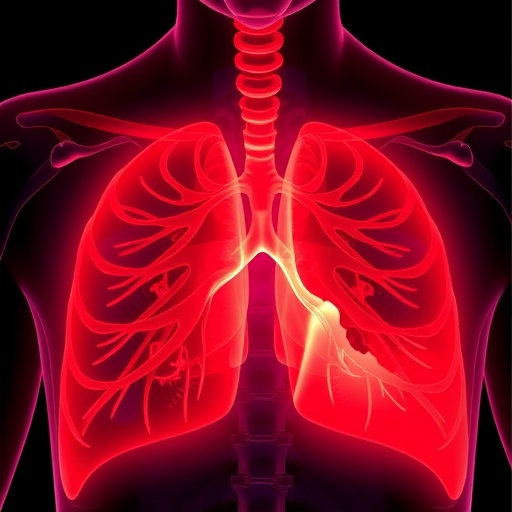In a groundbreaking study published in the “Journal of General Internal Medicine,” researchers have unveiled a rare yet concerning initial presentation of Amyotrophic Lateral Sclerosis (ALS) characterized by respiratory onset. Traditional understanding has often linked initial symptoms of ALS to muscular weakness or the gradual loss of mobility. However, the paper authored by Howard-Williams, Ossman, and Fuller emphasizes the necessity of recognizing respiratory complications as a potential alarming precursor to what is typically perceived as a neuromuscular disease.
The research offers an in-depth exploration of the etiology behind this atypical onset, underscoring the pivotal role that respiratory function plays in ALS progression. As the disease primarily targets motor neurons, the impact on respiratory muscles can severely compromise pulmonary function, thus presenting distinct yet often unrecognized symptoms. This highlights the need for heightened vigilance among healthcare providers, particularly when faced with patients exhibiting unexplained respiratory difficulties.
A concerning trend identified in the study reveals that many patients presenting with respiratory issues are frequently misdiagnosed or overlooked, leading to delays in appropriate treatment. This misdiagnosis can have dire consequences, as prompt intervention in ALS is crucial for managing symptoms and extending life expectancy. This study shines a spotlight on the need for better diagnostic criteria that account for varied presentations of ALS, especially for those beginning with respiratory complications.
The authors conducted a comprehensive review of clinical cases, examining the patient histories of individuals who initially presented with respiratory symptoms. Through this analysis, they unearthed a significant correlation between early respiratory distress and subsequent motor neuron decline. The intricate relationship between respiratory and muscular function becomes imperative as it underscores the multifaceted nature of ALS.
Moreover, the study addresses potential mechanisms at play in the pathophysiology of respiratory-onset ALS. It suggests that neurodegeneration in ALS might not be confined solely to motor neurons with the onset of muscle weakness but could encompass related neuronal pathways affecting respiratory control. The implication is clear: our understanding of ALS must adapt to embrace its complexities, particularly as they relate to respiratory function.
The implications of this research extend beyond the clinical domain; they hold crucial significance for public health strategies geared towards enhancing early detection of ALS. Educational initiatives aimed at both clinicians and potential patients could revolutionize how respiratory symptoms are contextualized within the landscape of ALS presentations. Such initiatives could foster a culture of awareness that encourages both patients and healthcare workers to connect the dots between respiratory challenges and the potential for neurodegenerative diseases.
In this modern era of medicine, where technology and science intertwine, the study also hints at the potential for innovative diagnostic tools that could facilitate early detection of respiratory-onset ALS. Advances in imaging technology and biomarkers could pave the way for a more nuanced understanding of how ALS evolves and manifests in different individuals. As we push forward into an age of personalized medicine, the integration of such tools could become integral to standard practice in neurology.
While the findings are indeed sobering, they also open the door to a renewed focus on research that could illuminate pathways for therapeutic intervention. Future studies might delve deeper into targeted therapies that could stabilize respiratory function in ALS patients, potentially extending their quality of life significantly. This presents a tactical opportunity to reframe our approach to ALS, shifting from a solely symptom management perspective to a more proactive strategy aimed at preserving function.
The urgency for further exploration in this area cannot be overstated. It is not just the continuation of life that is at stake; it is the quality of life that individuals endure as they navigate this chronic illness. The potential for respiratory involvement to dictate the initial clinical approach to ALS patients brings forth an entirely new dimension into the management of the disease.
The study’s revelations mark a pivotal moment in our understanding of ALS, prompting a critical reassessment of existing diagnostic and treatment frameworks. With rising awareness, the hope is that medical practitioners will be emboldened to explore the less conventional presentations of ALS, drawing attention to the myriad ways in which the disease can manifest. This enlightened perspective has the potential to foster a more holistic treatment paradigm—one that considers all possible symptoms, including respiratory.
As the medical community begins to recognize and embrace these variations in presentation, it serves as a powerful reminder of the ongoing journey to understanding ALS. Every insight into its development could ultimately stem the tide of this debilitating disease for many. The respiratory onset of ALS may just be the tip of the iceberg in terms of what lies beneath this complex, multifaceted disorder.
The findings echo throughout the healthcare community, evoking an evolution in thought regarding patient evaluation. Could it be that the symptoms we once deemed unrelated hold the keys to unlocking earlier interventions that dramatically change the lives of those impacted by ALS? The investigation into respiratory onset could empower a generation of healthcare providers to advocate ardently for atypical presentations, thereby transforming lives.
In summary, Howard-Williams and colleagues have contributed a significant chapter to the ongoing discourse surrounding ALS. By unraveling the complexities of respiratory-onset symptoms, we inch closer to a more profound understanding of the disease. It is this understanding that fuels innovation and guides research towards novel therapeutic strategies, ultimately ushering in a new dawn for ALS patients.
Subject of Research: Respiratory-Onset Amyotrophic Lateral Sclerosis (ALS)
Article Title: Respiratory-Onset Amyotrophic Lateral Sclerosis (ALS): A Rare Initial Presentation
Article References:
Howard-Williams, E.L., Ossman, P. & Fuller, J. Respiratory-Onset Amyotrophic Lateral Sclerosis (ALS): A Rare Initial Presentation.
J GEN INTERN MED (2025). https://doi.org/10.1007/s11606-025-09831-w
Image Credits: AI Generated
DOI: 10.1007/s11606-025-09831-w
Keywords: ALS, Amyotrophic Lateral Sclerosis, respiratory onset, neurodegeneration, early detection, patient management, clinical implications.
Tags: amyotrophic lateral sclerosis researchatypical ALS onsetdiagnostic challenges in ALSearly symptoms of ALShealthcare provider awareness ALSimportance of prompt ALS treatmentmisdiagnosis of ALSneuromuscular disease presentationspulmonary function in ALSrare respiratory onset ALSrespiratory complications in ALSrespiratory difficulties in ALS patients





